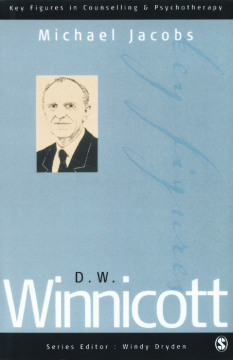
Additional Information
Book Details
Abstract
`The importance of Michael Jacobs' book lies in his attempt to convey... Winnicott's profound influence.... Jacobs rightly delights in the creativity and imagination of his subject and illustrates these with numerous quotations and descriptions from Winnicott's writings.... What is conveyed throughout the book is the essence of Winnicott.... [whose] gift was to make psychoanalytic language, methods and concepts more widely available, accepted and appreciated to a nonpsychoanalytic world' - British Psychological Society Counselling Psychology Review
One of the best-known British psychoanalysts, D W Winnicott attracts the interest of counsellors and psychotherapists far beyond the strict psychoanalytic tradition in which he was trained. He coined many phrases that have entered the discourse of therapy, such as `good enough mother', `transitional object' and `facilitating environment'. Winnicott has had a profound impact on research into the mother-baby relationship, and his unorthodox manner and sparkling writing style have attracted enthusiastic acclaim.
In this book, Michael Jacobs summarizes Winnicott's life and explains his major theoretical concepts. He also rigorously evaluates his practice as a clinician - for example, the holding and management of deeply regressed patients. While highlighting Winnicott's brilliance and creativity, Jacobs is not afraid to scrutinize his contributions more critically. He also discusses criticisms others have made of Winnicott, notably within the psychoanalytic movement. The final chapter assesses the influence of Winnicott's thinking in other countries as well as in Britain.
`A readable and informative book... comparisons and criticisms are refreshing and help put Winnicott in context with others' - Therapeutic Communities
`A good introduction to Winnicott's key ideas. It provides a survey of the scope of his ideas, and a critical appraisal of their place and value in the context of the helping professions... Jacobs' book makes for easy reading... social workers, psychologists and child-care workers who are curious about Winnicott's contribution, but not sure where to start, would do well to start here' - Psychology in Society
`The importance of Michael Jacobs' book lies in his attempt to convey - to a readership not necessarily familiar with current psychoanalytic thinking - Winnicott's profound influence... Jacobs rightly delights in the creativity and imagination of his subject and illustrates these with numerous quotations and descriptions from Winnicott's writings... What is conveyed throughout the book is the essence of Winnicott... [whose] gift was to make psychoanalytic language, methods and concepts more widely available, accepted and appreciated to a non-psychoanalytic world. He emerges from the book as that rare being, a positive and personable psychoanalyst' - British Psychological Society Counselling Psychology Review
`Raises questions and challenges assumptions in a way which is bound to tempt many readers to delve deeper' - Counselling, The Journal of the British Association for Counselling
`Immensely readable... Jacobs' book on Winnicott is not only an enjoyable read... but it is also well-researched and conveys the essential nature of the man and his approach to his work with both children and adults. I felt at the end I knew him more intimately - his strengths and weaknesses, his biases and foibles - as well as having him more securely placed in the psychoanalytic theoretical matrix, and knowing more about his influence and how he in turn was influenced... Winnicott's well-known phrases - "the good enough mother", "the transitional object", "the facilitating environment" - are all examined, along with the spatula game and the use of the squiggle. These Winnicottian "phenomena" are set within their contexts, often with engaging examples of how he arrived at these concepts and ideas, which add substance and understanding. Indeed, Jacobs' examples of Winnicott's practice - in particular, how he worked with children - are particularly illuminating and absorbing to read... This text provides all the essential information on Winnicott... I wholeheartedly recommend it' - British Journal of Guidance & Counselling
`[A] comprehensive assessment of Winnicott's work and influence' - Self & Society
